Organisations Linked with the Industry Sectoral Organisations.
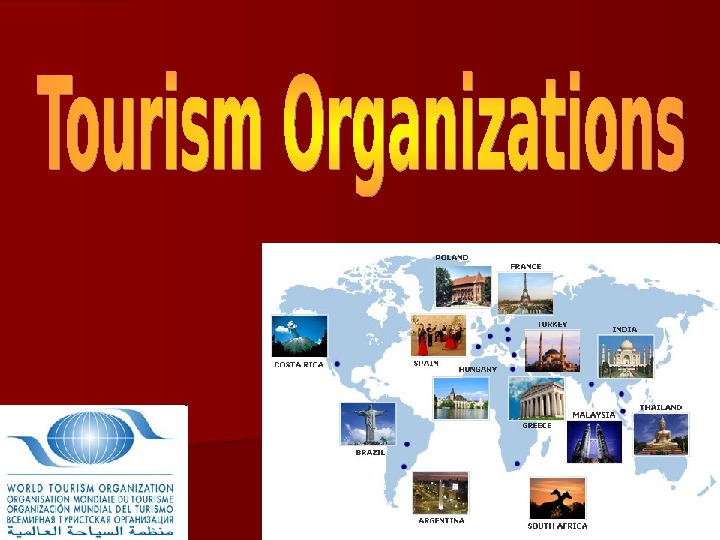
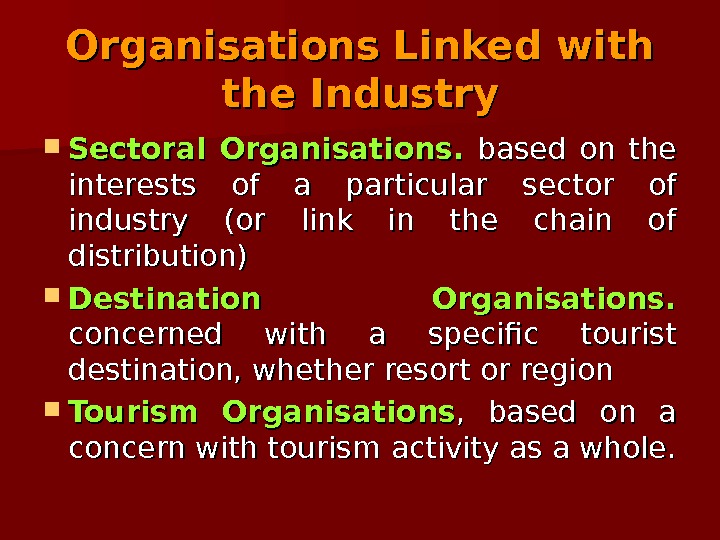
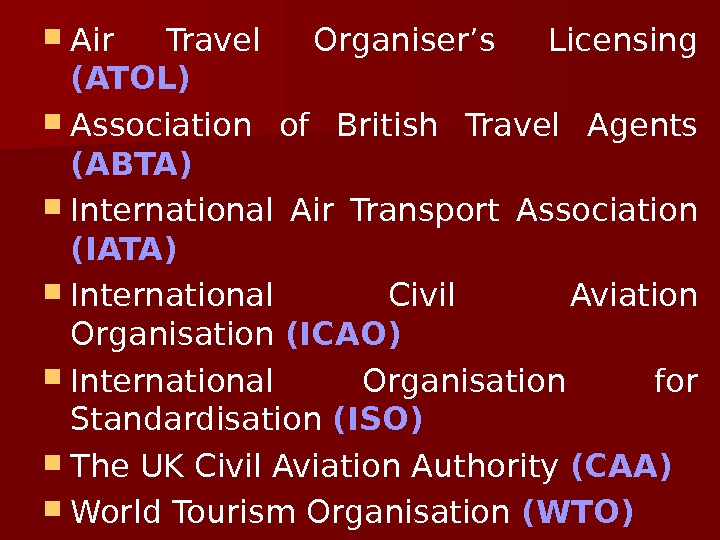
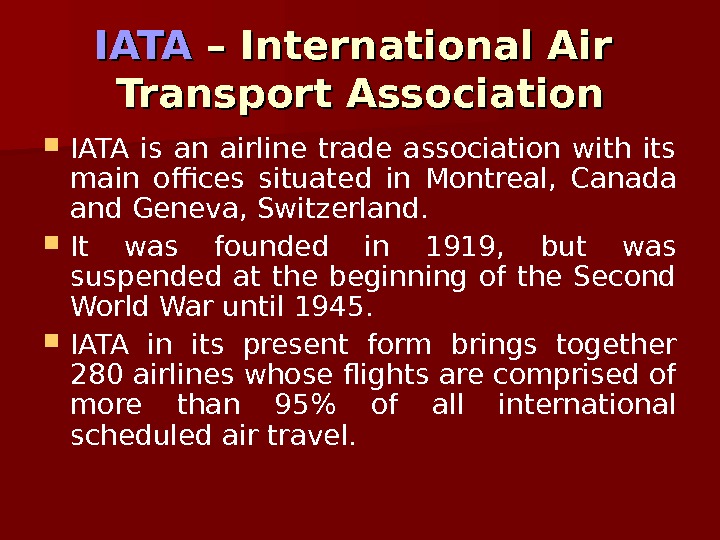
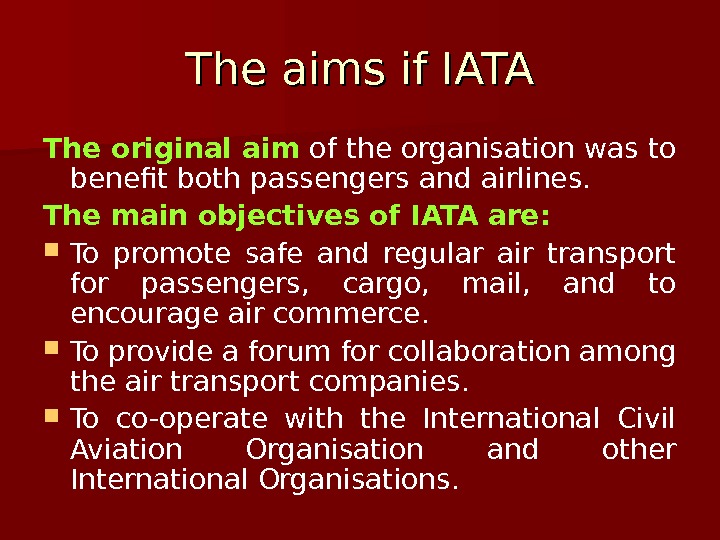
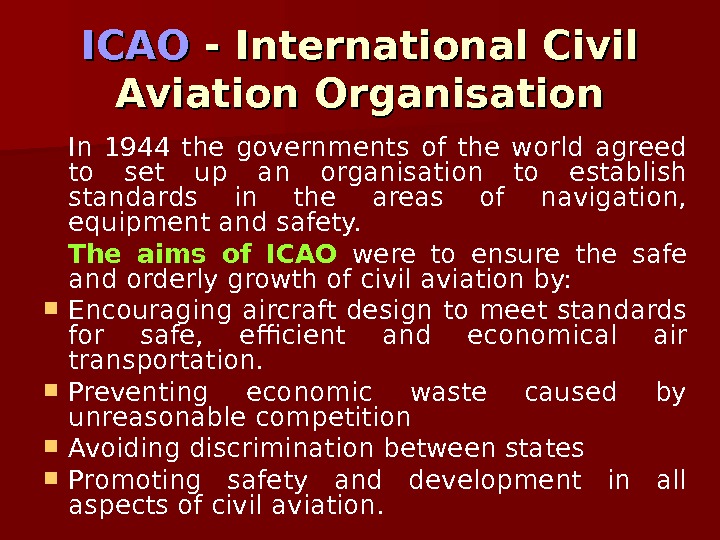
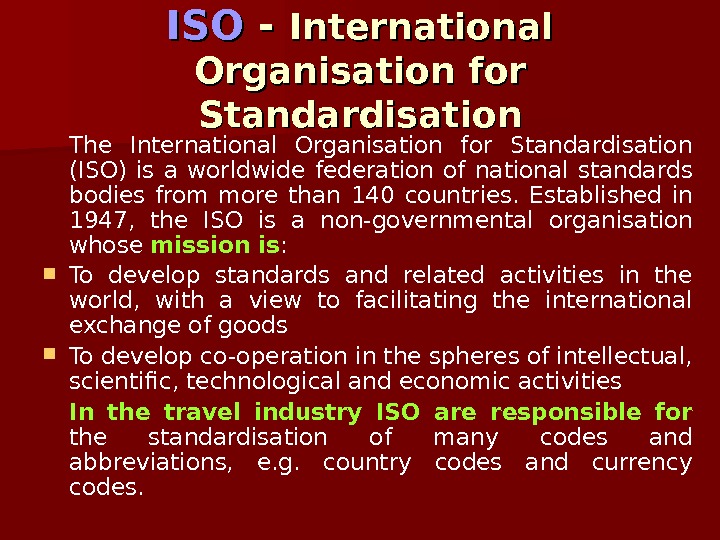
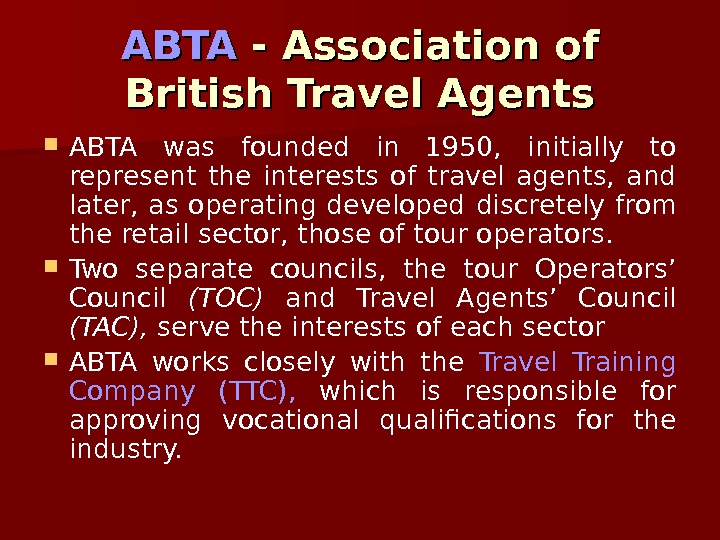
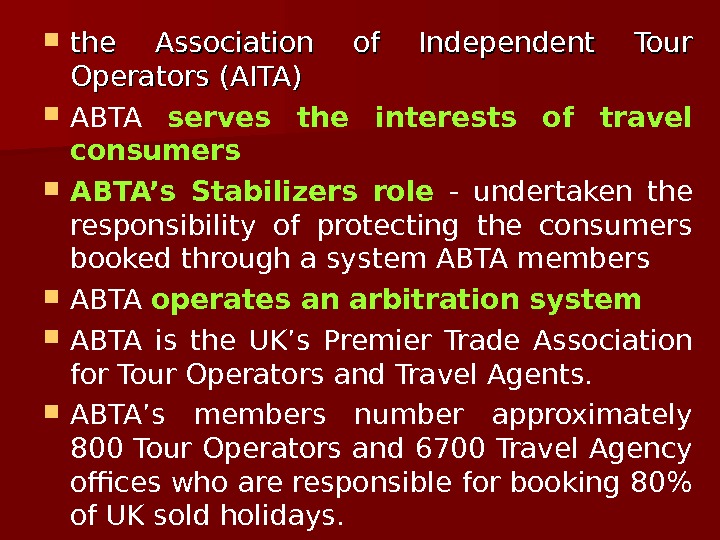
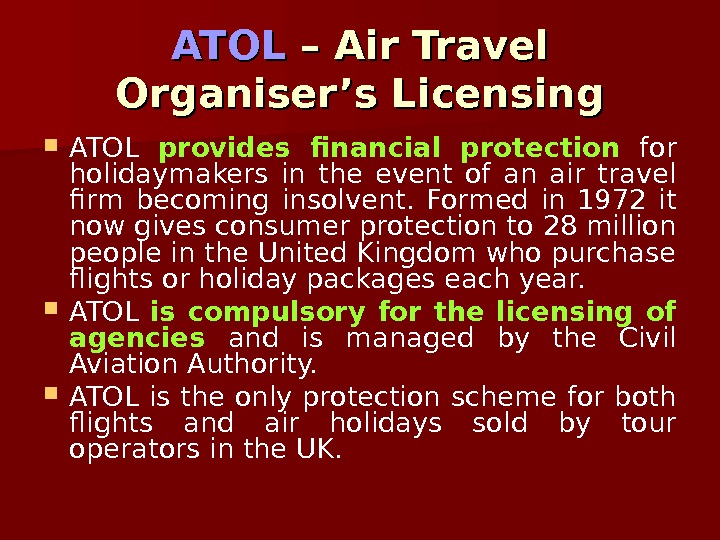
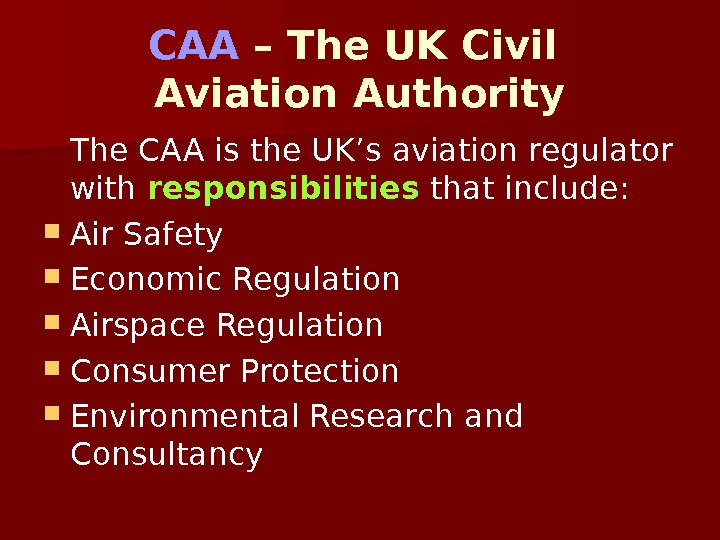
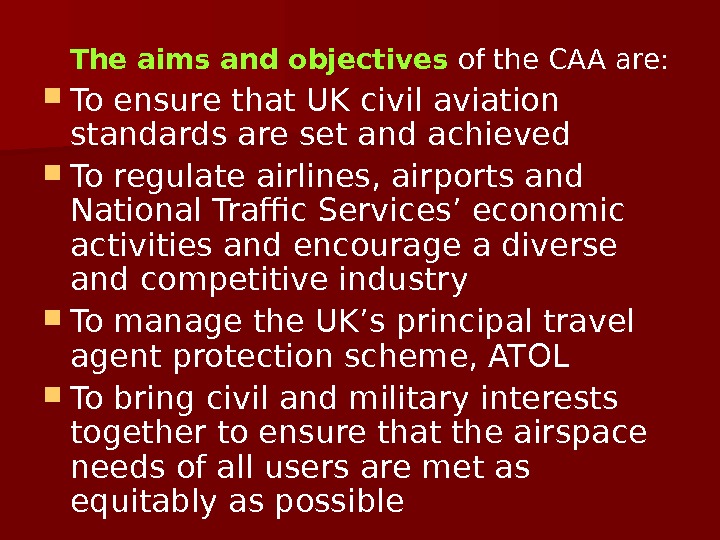
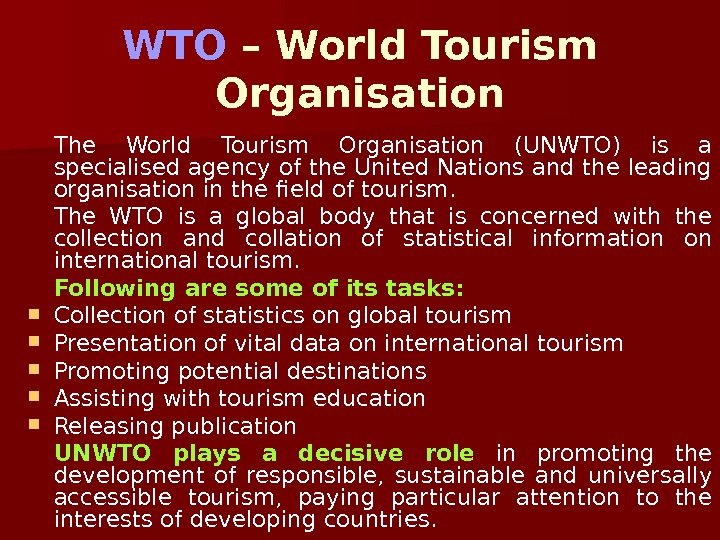
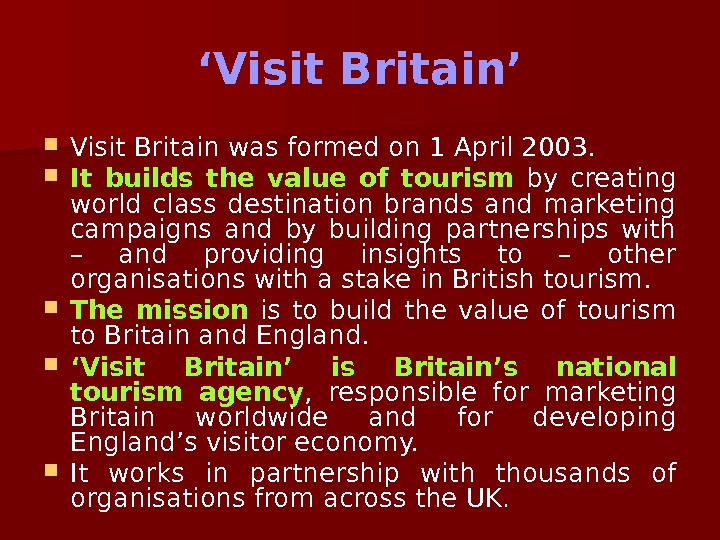
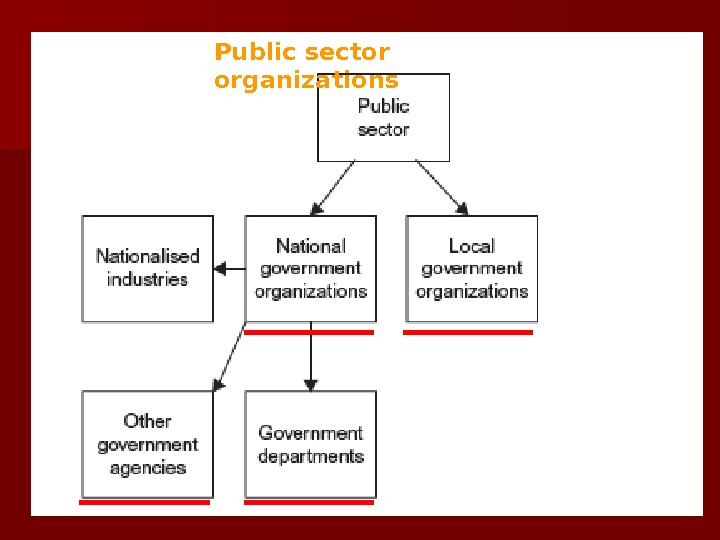
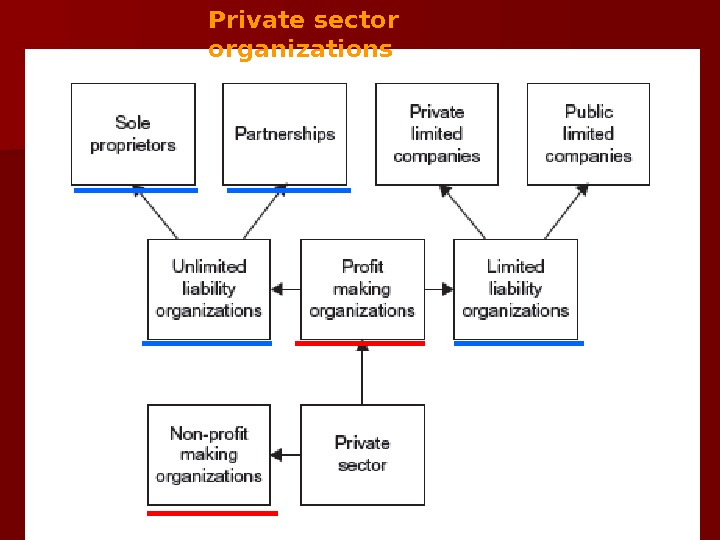
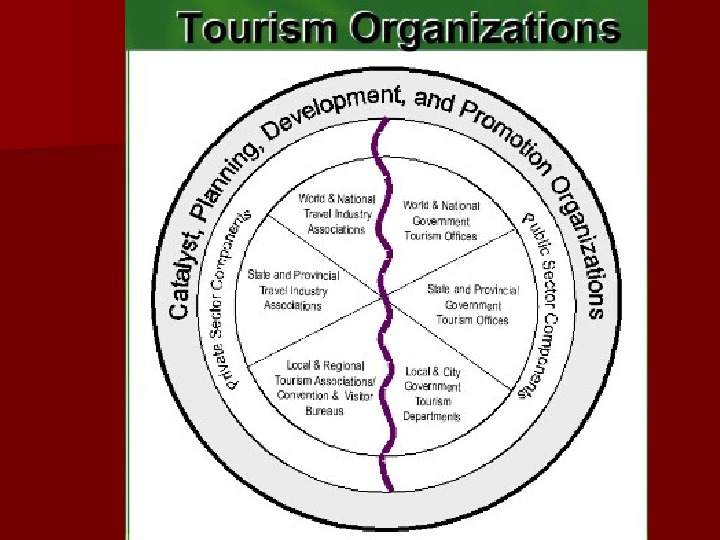
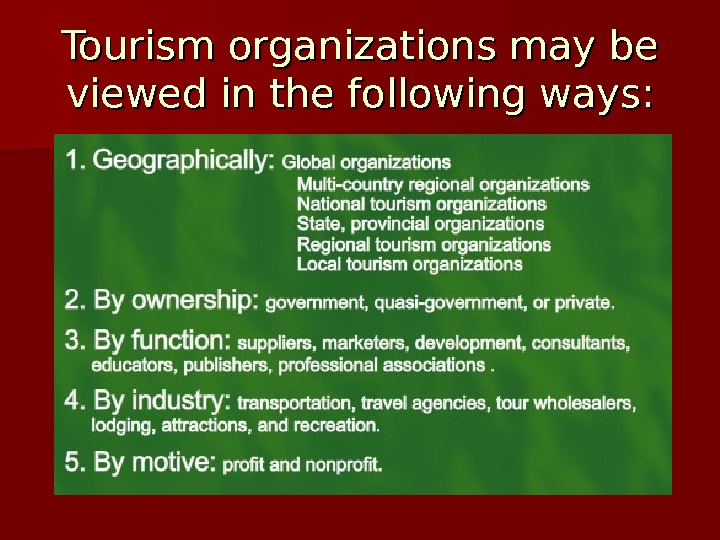
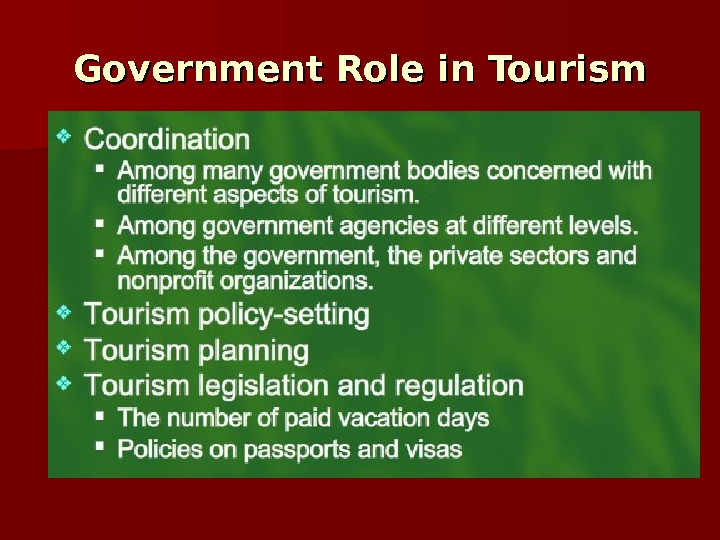
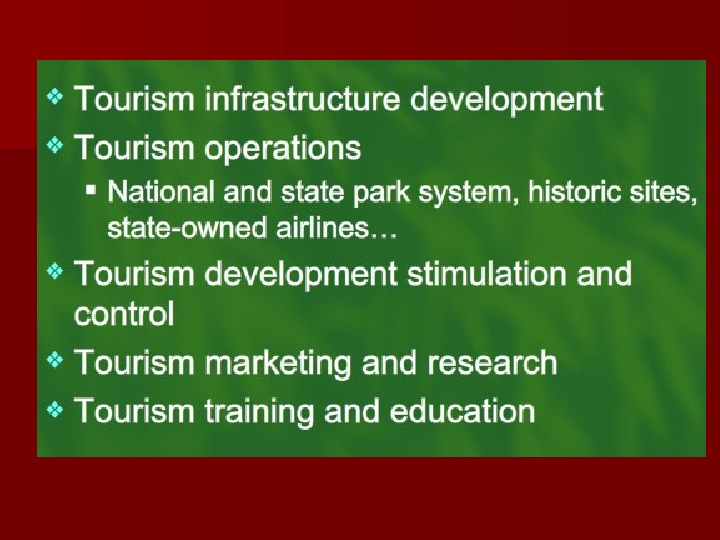
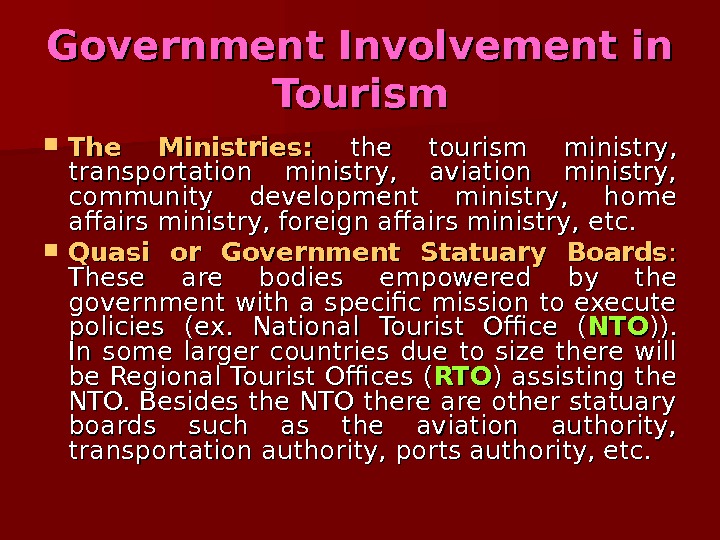
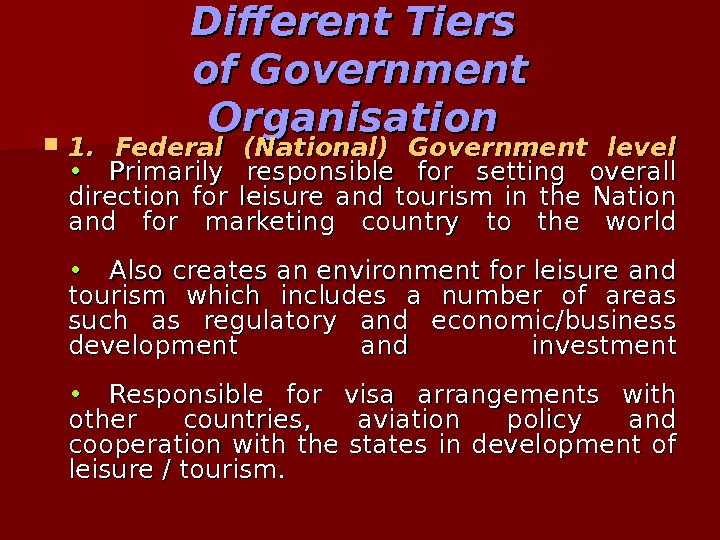
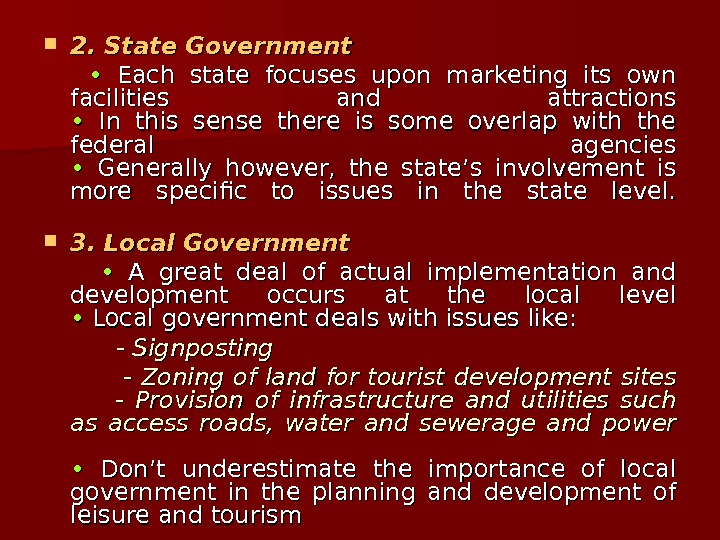
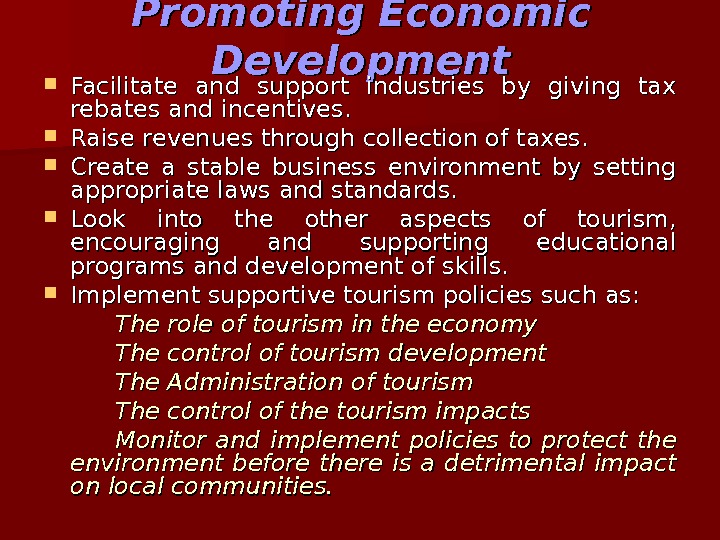
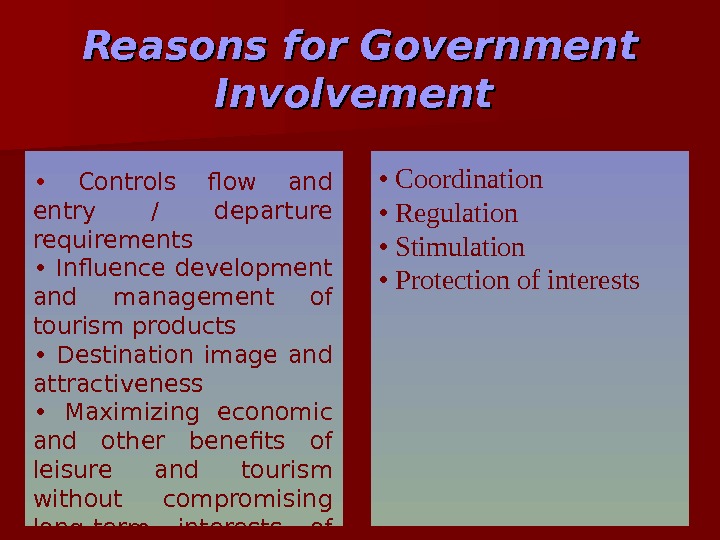
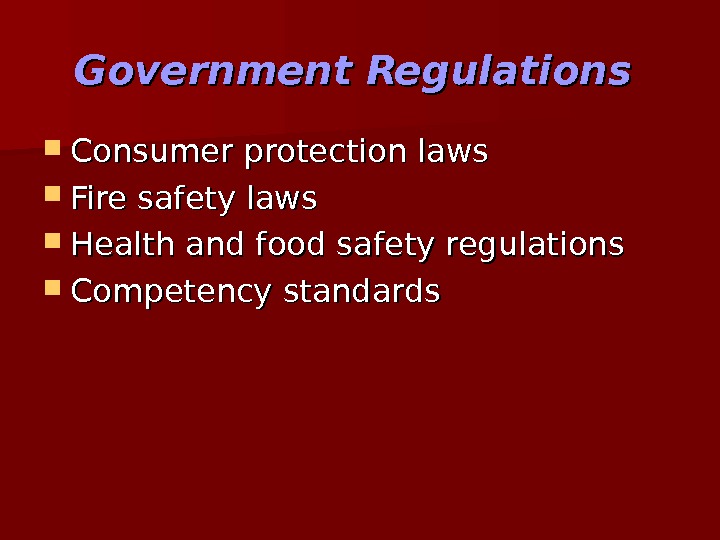
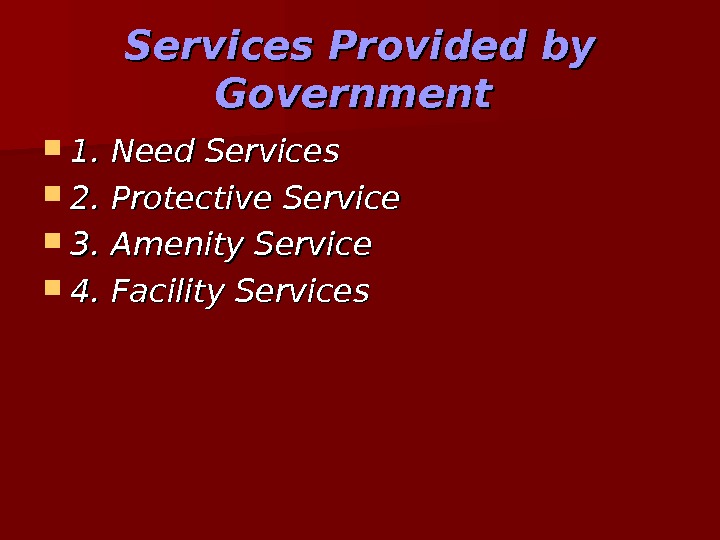
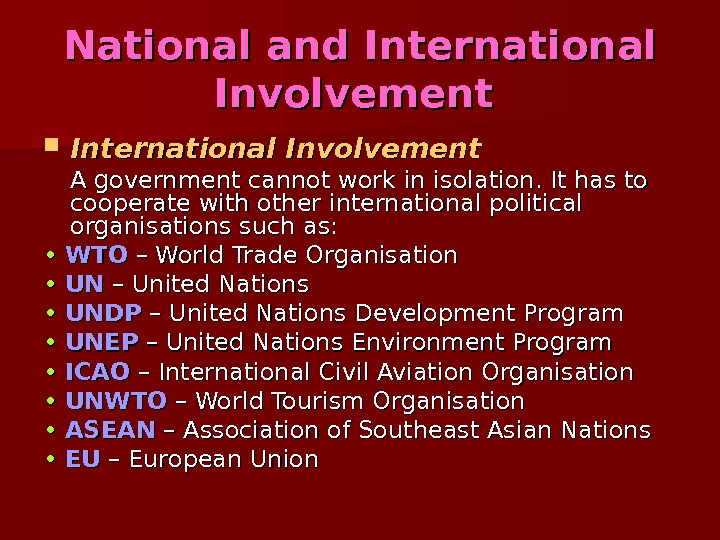
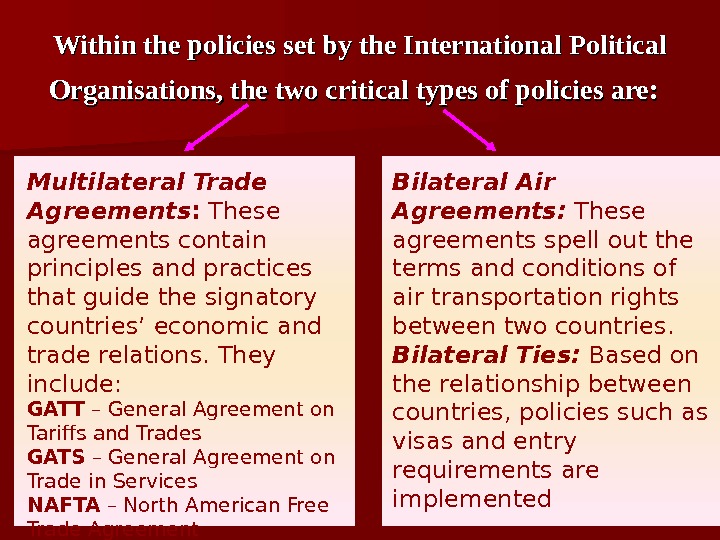
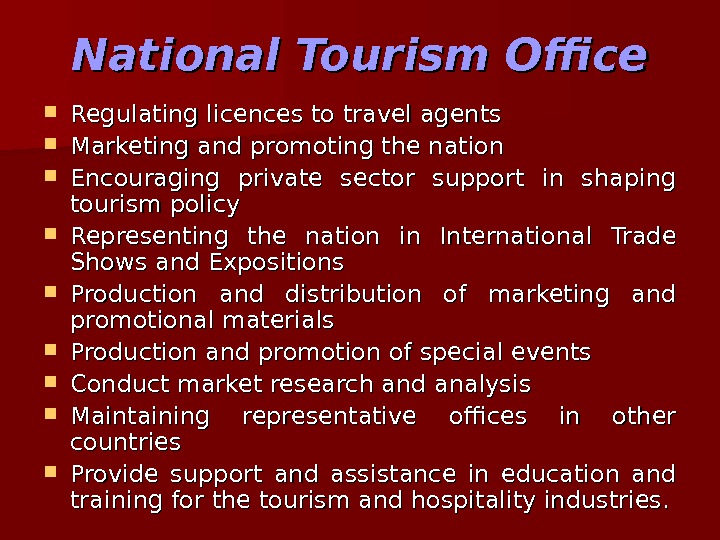
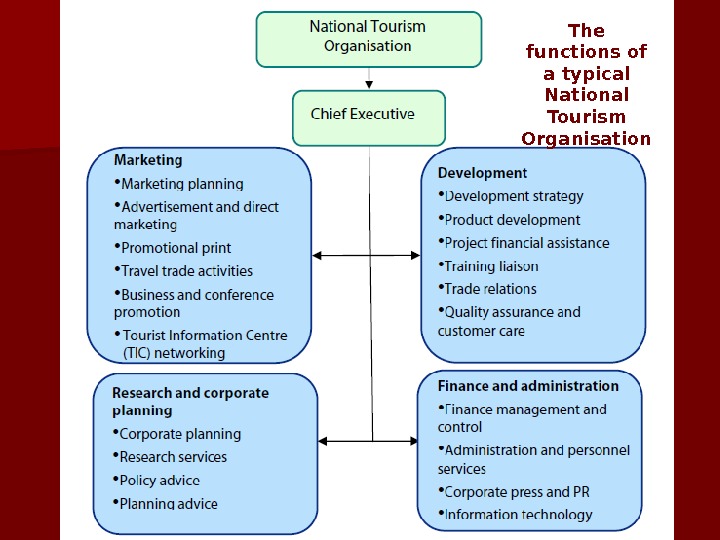
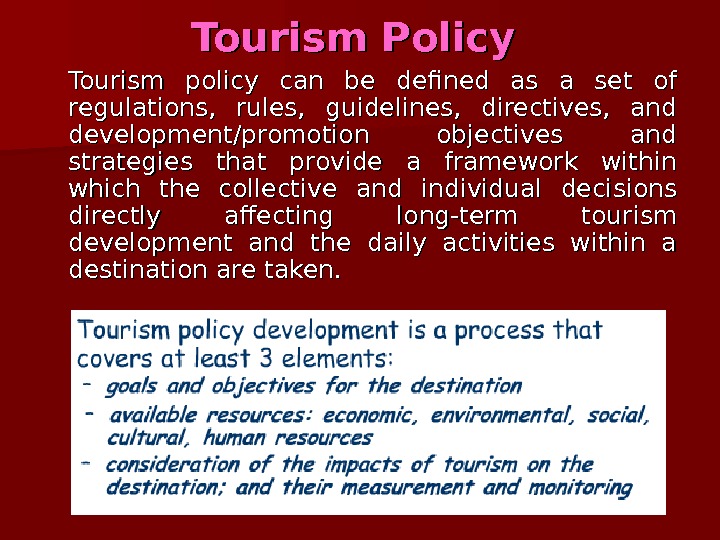
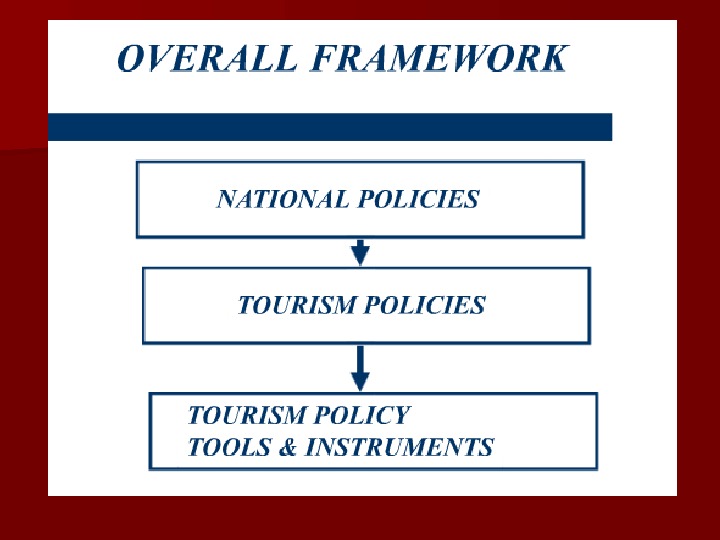
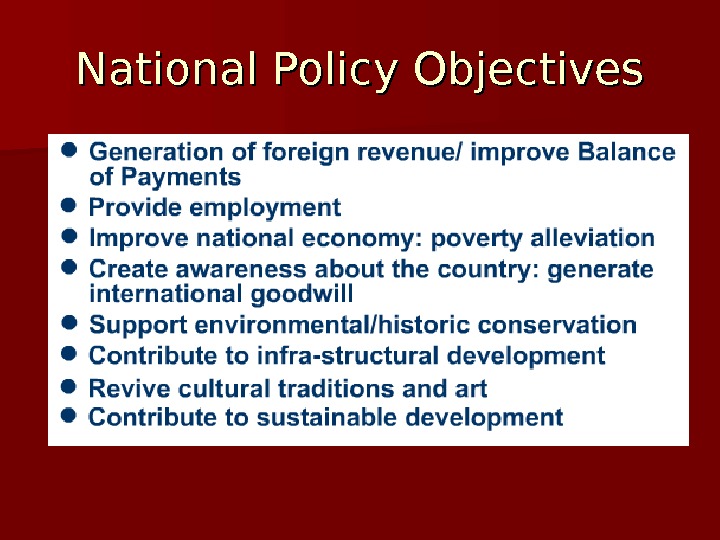

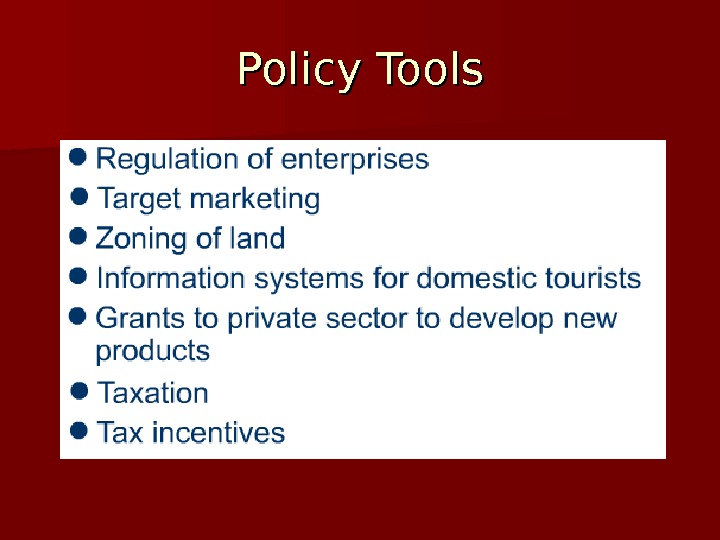
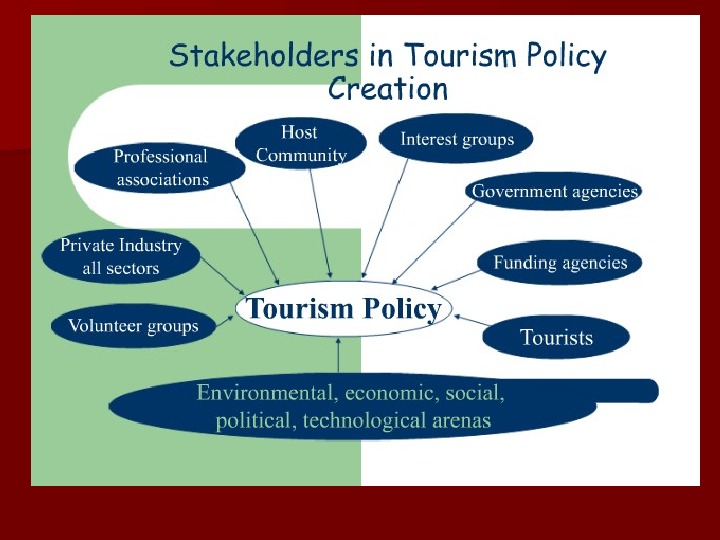
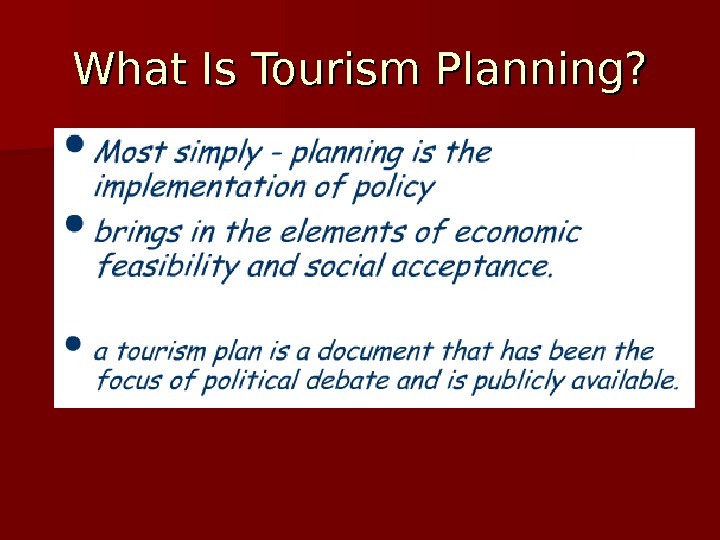
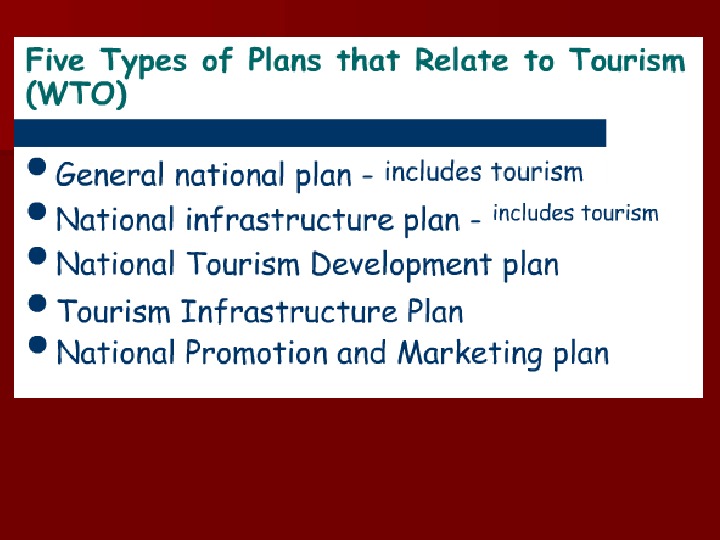
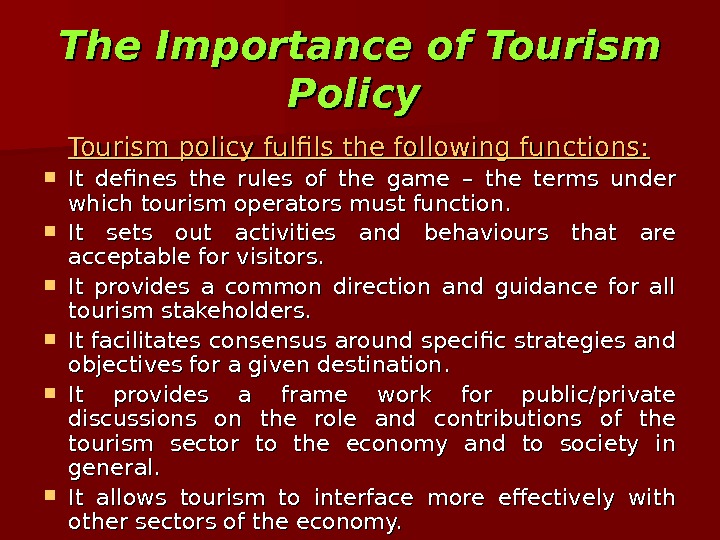
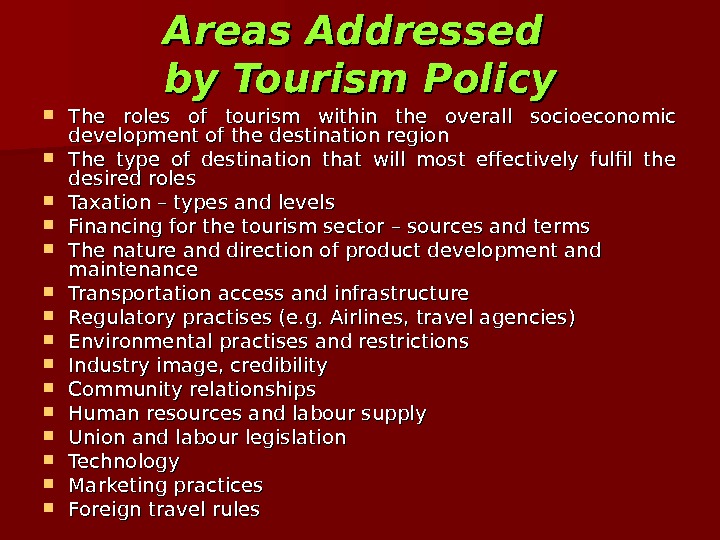
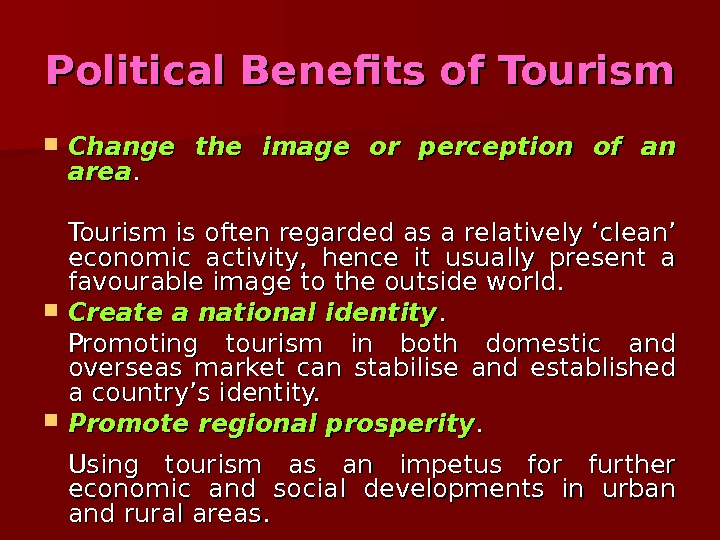
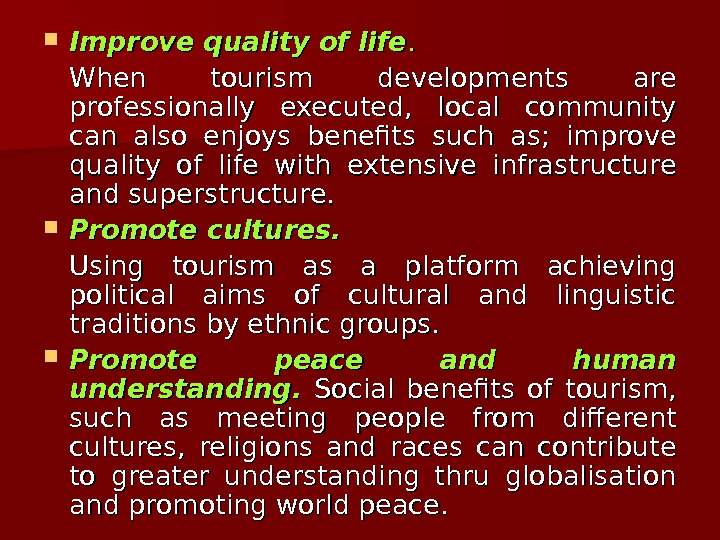
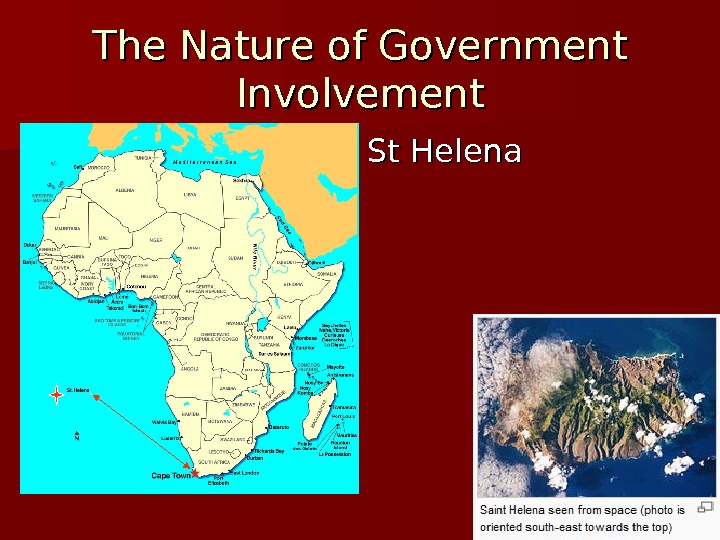

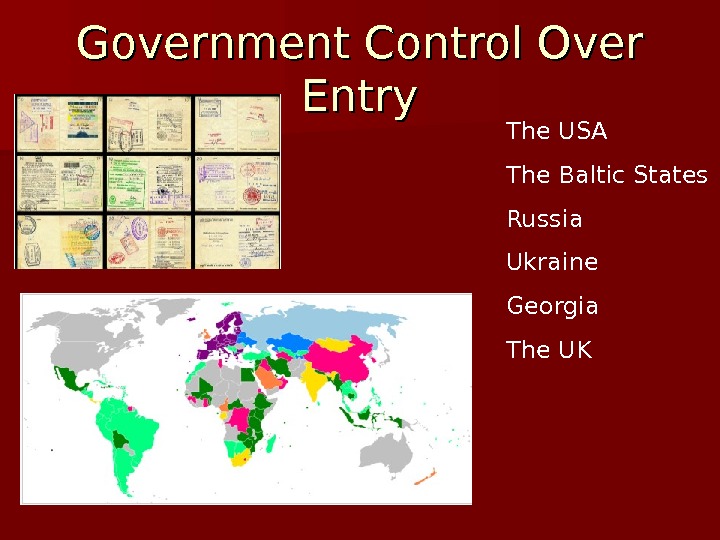
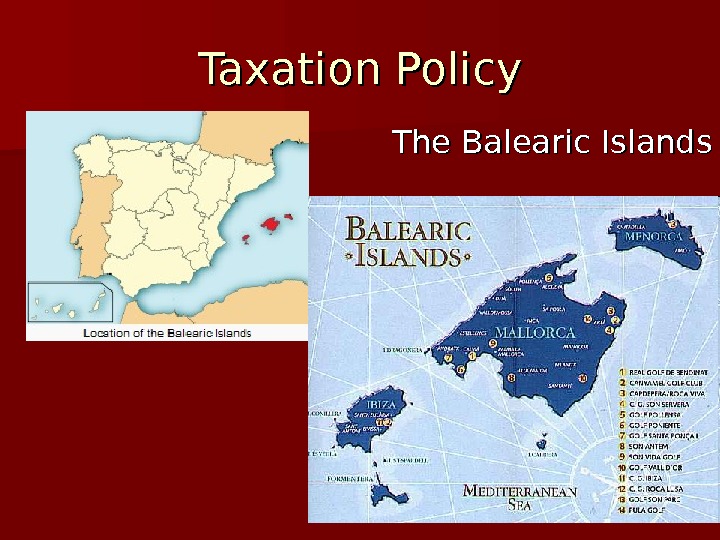
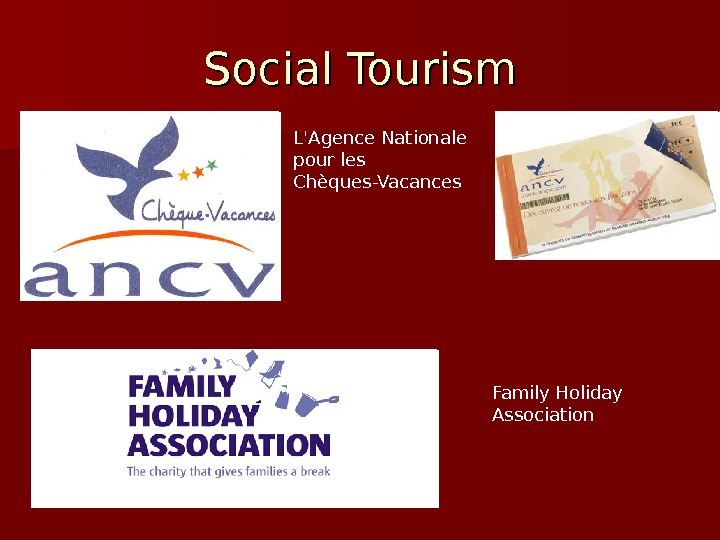

lecture_5._tourism_organizations.ppt
- Размер: 3 Mегабайта
- Количество слайдов: 49
Описание презентации Organisations Linked with the Industry Sectoral Organisations. по слайдам

 Organisations Linked with the Industry Sectoral Organisations. based on the interests of a particular sector of industry (or link in the chain of distribution) Destination Organisations. concerned with a specific tourist destination, whether resort or region Tourism Organisations , based on a concern with tourism activity as a whole.
Organisations Linked with the Industry Sectoral Organisations. based on the interests of a particular sector of industry (or link in the chain of distribution) Destination Organisations. concerned with a specific tourist destination, whether resort or region Tourism Organisations , based on a concern with tourism activity as a whole.
 Air Travel Organiser’s Licensing (ATOL) Association of British Travel Agents (ABTA) International Air Transport Association (IATA) International Civil Aviation Organisation (ICAO) International Organisation for Standardisation (ISO) The UK Civil Aviation Authority (CAA) World Tourism Organisation (WTO)
Air Travel Organiser’s Licensing (ATOL) Association of British Travel Agents (ABTA) International Air Transport Association (IATA) International Civil Aviation Organisation (ICAO) International Organisation for Standardisation (ISO) The UK Civil Aviation Authority (CAA) World Tourism Organisation (WTO)
 IATA – International Air Transport Association IATA is an airline trade association with its main offices situated in Montreal, Canada and Geneva, Switzerland. It was founded in 1919, but was suspended at the beginning of the Second World War until 1945. IATA in its present form brings together 280 airlines whose flights are comprised of more than 95% of all international scheduled air travel.
IATA – International Air Transport Association IATA is an airline trade association with its main offices situated in Montreal, Canada and Geneva, Switzerland. It was founded in 1919, but was suspended at the beginning of the Second World War until 1945. IATA in its present form brings together 280 airlines whose flights are comprised of more than 95% of all international scheduled air travel.
 The aims if IATA The original aim of the organisation was to benefit both passengers and airlines. The main objectives of IATA are: To promote safe and regular air transport for passengers, cargo, mail, and to encourage air commerce. To provide a forum for collaboration among the air transport companies. To co-operate with the International Civil Aviation Organisation and other International Organisations.
The aims if IATA The original aim of the organisation was to benefit both passengers and airlines. The main objectives of IATA are: To promote safe and regular air transport for passengers, cargo, mail, and to encourage air commerce. To provide a forum for collaboration among the air transport companies. To co-operate with the International Civil Aviation Organisation and other International Organisations.
 ICAO — International Civil Aviation Organisation In 1944 the governments of the world agreed to set up an organisation to establish standards in the areas of navigation, equipment and safety. The aims of ICAO were to ensure the safe and orderly growth of civil aviation by: Encouraging aircraft design to meet standards for safe, efficient and economical air transportation. Preventing economic waste caused by unreasonable competition Avoiding discrimination between states Promoting safety and development in all aspects of civil aviation.
ICAO — International Civil Aviation Organisation In 1944 the governments of the world agreed to set up an organisation to establish standards in the areas of navigation, equipment and safety. The aims of ICAO were to ensure the safe and orderly growth of civil aviation by: Encouraging aircraft design to meet standards for safe, efficient and economical air transportation. Preventing economic waste caused by unreasonable competition Avoiding discrimination between states Promoting safety and development in all aspects of civil aviation.
 ISOISO — — International Organisation for Standardisation The International Organisation for Standardisation (ISO) is a worldwide federation of national standards bodies from more than 140 countries. Established in 1947, the ISO is a non-governmental organisation whose mission is : To develop standards and related activities in the world, with a view to facilitating the international exchange of goods To develop co-operation in the spheres of intellectual, scientific, technological and economic activities In the travel industry ISO are responsible for the standardisation of many codes and abbreviations, e. g. country codes and currency codes.
ISOISO — — International Organisation for Standardisation The International Organisation for Standardisation (ISO) is a worldwide federation of national standards bodies from more than 140 countries. Established in 1947, the ISO is a non-governmental organisation whose mission is : To develop standards and related activities in the world, with a view to facilitating the international exchange of goods To develop co-operation in the spheres of intellectual, scientific, technological and economic activities In the travel industry ISO are responsible for the standardisation of many codes and abbreviations, e. g. country codes and currency codes.
 ABTA — Association of British Travel Agents ABTA was founded in 1950, initially to represent the interests of travel agents, and later, as operating developed discretely from the retail sector, those of tour operators. Two separate councils, the tour Operators’ Council (TOC) and Travel Agents’ Council (TAC), serve the interests of each sector ABTA works closely with the Travel Training Company (TTC), which is responsible for approving vocational qualifications for the industry.
ABTA — Association of British Travel Agents ABTA was founded in 1950, initially to represent the interests of travel agents, and later, as operating developed discretely from the retail sector, those of tour operators. Two separate councils, the tour Operators’ Council (TOC) and Travel Agents’ Council (TAC), serve the interests of each sector ABTA works closely with the Travel Training Company (TTC), which is responsible for approving vocational qualifications for the industry.
 the Association of Independent Tour Operators (AITA) ABTA serves the interests of travel consumers ABTA’s Stabilizers role — undertaken the responsibility of protecting the consumers booked through a system ABTA members ABTA operates an arbitration system ABTA is the UK’s Premier Trade Association for Tour Operators and Travel Agents. ABTA’s members number approximately 800 Tour Operators and 6700 Travel Agency offices who are responsible for booking 80% of UK sold holidays.
the Association of Independent Tour Operators (AITA) ABTA serves the interests of travel consumers ABTA’s Stabilizers role — undertaken the responsibility of protecting the consumers booked through a system ABTA members ABTA operates an arbitration system ABTA is the UK’s Premier Trade Association for Tour Operators and Travel Agents. ABTA’s members number approximately 800 Tour Operators and 6700 Travel Agency offices who are responsible for booking 80% of UK sold holidays.
 ATOL – Air Travel Organiser’s Licensing ATOL provides financial protection for holidaymakers in the event of an air travel firm becoming insolvent. Formed in 1972 it now gives consumer protection to 28 million people in the United Kingdom who purchase flights or holiday packages each year. ATOL is compulsory for the licensing of agencies and is managed by the Civil Aviation Authority. ATOL is the only protection scheme for both flights and air holidays sold by tour operators in the UK.
ATOL – Air Travel Organiser’s Licensing ATOL provides financial protection for holidaymakers in the event of an air travel firm becoming insolvent. Formed in 1972 it now gives consumer protection to 28 million people in the United Kingdom who purchase flights or holiday packages each year. ATOL is compulsory for the licensing of agencies and is managed by the Civil Aviation Authority. ATOL is the only protection scheme for both flights and air holidays sold by tour operators in the UK.
 CAA – The UK Civil Aviation Authority The CAA is the UK’s aviation regulator with responsibilities that include: Air Safety Economic Regulation Airspace Regulation Consumer Protection Environmental Research and Consultancy
CAA – The UK Civil Aviation Authority The CAA is the UK’s aviation regulator with responsibilities that include: Air Safety Economic Regulation Airspace Regulation Consumer Protection Environmental Research and Consultancy
 The aims and objectives of the CAA are: To ensure that UK civil aviation standards are set and achieved To regulate airlines, airports and National Traffic Services’ economic activities and encourage a diverse and competitive industry To manage the UK’s principal travel agent protection scheme, ATOL To bring civil and military interests together to ensure that the airspace needs of all users are met as equitably as possible
The aims and objectives of the CAA are: To ensure that UK civil aviation standards are set and achieved To regulate airlines, airports and National Traffic Services’ economic activities and encourage a diverse and competitive industry To manage the UK’s principal travel agent protection scheme, ATOL To bring civil and military interests together to ensure that the airspace needs of all users are met as equitably as possible
 WTO – World Tourism Organisation The World Tourism Organisation (UNWTO) is a specialised agency of the United Nations and the leading organisation in the field of tourism. The WTO is a global body that is concerned with the collection and collation of statistical information on international tourism. Following are some of its tasks: Collection of statistics on global tourism Presentation of vital data on international tourism Promoting potential destinations Assisting with tourism education Releasing publication UNWTO plays a decisive role in promoting the development of responsible, sustainable and universally accessible tourism, paying particular attention to the interests of developing countries.
WTO – World Tourism Organisation The World Tourism Organisation (UNWTO) is a specialised agency of the United Nations and the leading organisation in the field of tourism. The WTO is a global body that is concerned with the collection and collation of statistical information on international tourism. Following are some of its tasks: Collection of statistics on global tourism Presentation of vital data on international tourism Promoting potential destinations Assisting with tourism education Releasing publication UNWTO plays a decisive role in promoting the development of responsible, sustainable and universally accessible tourism, paying particular attention to the interests of developing countries.
 ‘ Visit Britain’ Visit Britain was formed on 1 April 2003. It builds the value of tourism by creating world class destination brands and marketing campaigns and by building partnerships with – and providing insights to – other organisations with a stake in British tourism. The mission is to build the value of tourism to Britain and England. ‘ Visit Britain’ is Britain’s national tourism agency , responsible for marketing Britain worldwide and for developing England’s visitor economy. It works in partnership with thousands of organisations from across the UK.
‘ Visit Britain’ Visit Britain was formed on 1 April 2003. It builds the value of tourism by creating world class destination brands and marketing campaigns and by building partnerships with – and providing insights to – other organisations with a stake in British tourism. The mission is to build the value of tourism to Britain and England. ‘ Visit Britain’ is Britain’s national tourism agency , responsible for marketing Britain worldwide and for developing England’s visitor economy. It works in partnership with thousands of organisations from across the UK.
 Public sector organizations
Public sector organizations
 Private sector organizations
Private sector organizations

 Tourism organizations may be viewed in the following ways:
Tourism organizations may be viewed in the following ways:
 Government Role in Tourism
Government Role in Tourism

 Government Involvement in Tourism The Ministries: the tourism ministry, transportation ministry, aviation ministry, community development ministry, home affairs ministry, foreign affairs ministry, etc. Quasi or Government Statuary Boards : : These are bodies empowered by the government with a specific mission to execute policies ( ( ex. National Tourist Office ( NTONTO )). In some larger countries due to size there will be Regional Tourist Offices ( RTORTO ) assisting the NTO. Besides the NTO there are other statuary boards such as the aviation authority, transportation authority, ports authority, etc.
Government Involvement in Tourism The Ministries: the tourism ministry, transportation ministry, aviation ministry, community development ministry, home affairs ministry, foreign affairs ministry, etc. Quasi or Government Statuary Boards : : These are bodies empowered by the government with a specific mission to execute policies ( ( ex. National Tourist Office ( NTONTO )). In some larger countries due to size there will be Regional Tourist Offices ( RTORTO ) assisting the NTO. Besides the NTO there are other statuary boards such as the aviation authority, transportation authority, ports authority, etc.
 Different Tiers of Government Organisation 1. Federal (National) Government level • • Primarily responsible for setting overall direction for leisure and tourism in the Nation and for marketing country to the world • • Also creates an environment for leisure and tourism which includes a number of areas such as regulatory and economic/business development and investment • • Responsible for visa arrangements with other countries, aviation policy and cooperation with the states in development of leisure / tourism.
Different Tiers of Government Organisation 1. Federal (National) Government level • • Primarily responsible for setting overall direction for leisure and tourism in the Nation and for marketing country to the world • • Also creates an environment for leisure and tourism which includes a number of areas such as regulatory and economic/business development and investment • • Responsible for visa arrangements with other countries, aviation policy and cooperation with the states in development of leisure / tourism.
 2. State Government • • Each state focuses upon marketing its own facilities and attractions • • In this sense there is some overlap with the federal agencies • • Generally however, the state’s involvement is more specific to issues in the state level. 3. Local Government • A great deal of actual implementation and development occurs at the local level • • Local government deals with issues like: — Signposting — Zoning of land for tourist development sites — Provision of infrastructure and utilities such as access roads, water and sewerage and power • • Don’t underestimate the importance of local government in the planning and development of leisure and tourism
2. State Government • • Each state focuses upon marketing its own facilities and attractions • • In this sense there is some overlap with the federal agencies • • Generally however, the state’s involvement is more specific to issues in the state level. 3. Local Government • A great deal of actual implementation and development occurs at the local level • • Local government deals with issues like: — Signposting — Zoning of land for tourist development sites — Provision of infrastructure and utilities such as access roads, water and sewerage and power • • Don’t underestimate the importance of local government in the planning and development of leisure and tourism
 Promoting Economic Development Facilitate and support industries by giving tax rebates and incentives. Raise revenues through collection of taxes. Create a stable business environment by setting appropriate laws and standards. Look into the other aspects of tourism, encouraging and supporting educational programs and development of skills. Implement supportive tourism policies such as: The role of tourism in the economy The control of tourism development The Administration of tourism The control of the tourism impacts Monitor and implement policies to protect the environment before there is a detrimental impact on local communities.
Promoting Economic Development Facilitate and support industries by giving tax rebates and incentives. Raise revenues through collection of taxes. Create a stable business environment by setting appropriate laws and standards. Look into the other aspects of tourism, encouraging and supporting educational programs and development of skills. Implement supportive tourism policies such as: The role of tourism in the economy The control of tourism development The Administration of tourism The control of the tourism impacts Monitor and implement policies to protect the environment before there is a detrimental impact on local communities.
 Reasons for Government Involvement • Controls flow and entry / departure requirements • Influence development and management of tourism products • Destination image and attractiveness • Maximizing economic and other benefits of leisure and tourism without compromising long-term interests of citizens. • Coordination • Regulation • Stimulation • Protection of interests
Reasons for Government Involvement • Controls flow and entry / departure requirements • Influence development and management of tourism products • Destination image and attractiveness • Maximizing economic and other benefits of leisure and tourism without compromising long-term interests of citizens. • Coordination • Regulation • Stimulation • Protection of interests
 Government Regulations Consumer protection laws Fire safety laws Health and food safety regulations Competency standards
Government Regulations Consumer protection laws Fire safety laws Health and food safety regulations Competency standards
 Services Provided by Government 1. Need Services 2. Protective Service 3. Amenity Service 4. Facility Services
Services Provided by Government 1. Need Services 2. Protective Service 3. Amenity Service 4. Facility Services
 National and International Involvement A government cannot work in isolation. It has to cooperate with other international political organisations such as: • • WTOWTO – World Trade Organisation • • UNUN – United Nations • • UNDP – United Nations Development Program • • UNEP – United Nations Environment Program • • ICAO – International Civil Aviation Organisation • • UNWTO – World Tourism Organisation • • ASEAN – Association of Southeast Asian Nations • • EUEU – European Union
National and International Involvement A government cannot work in isolation. It has to cooperate with other international political organisations such as: • • WTOWTO – World Trade Organisation • • UNUN – United Nations • • UNDP – United Nations Development Program • • UNEP – United Nations Environment Program • • ICAO – International Civil Aviation Organisation • • UNWTO – World Tourism Organisation • • ASEAN – Association of Southeast Asian Nations • • EUEU – European Union
 Within the policies set by the International Political Organisations, the two critical types of policies are: Multilateral Trade Agreements : These agreements contain principles and practices that guide the signatory countries’ economic and trade relations. They include: GATT – General Agreement on Tariffs and Trades GATS – General Agreement on Trade in Services NAFTA – North American Free Trade Agreement Bilateral Air Agreements: These agreements spell out the terms and conditions of air transportation rights between two countries. Bilateral Ties: Based on the relationship between countries, policies such as visas and entry requirements are implemented
Within the policies set by the International Political Organisations, the two critical types of policies are: Multilateral Trade Agreements : These agreements contain principles and practices that guide the signatory countries’ economic and trade relations. They include: GATT – General Agreement on Tariffs and Trades GATS – General Agreement on Trade in Services NAFTA – North American Free Trade Agreement Bilateral Air Agreements: These agreements spell out the terms and conditions of air transportation rights between two countries. Bilateral Ties: Based on the relationship between countries, policies such as visas and entry requirements are implemented
 National Tourism Office Regulating licences to travel agents Marketing and promoting the nation Encouraging private sector support in shaping tourism policy Representing the nation in International Trade Shows and Expositions Production and distribution of marketing and promotional materials Production and promotion of special events Conduct market research and analysis Maintaining representative offices in other countries Provide support and assistance in education and training for the tourism and hospitality industries.
National Tourism Office Regulating licences to travel agents Marketing and promoting the nation Encouraging private sector support in shaping tourism policy Representing the nation in International Trade Shows and Expositions Production and distribution of marketing and promotional materials Production and promotion of special events Conduct market research and analysis Maintaining representative offices in other countries Provide support and assistance in education and training for the tourism and hospitality industries.
 The functions of a typical National Tourism Organisation
The functions of a typical National Tourism Organisation
 Tourism Policy Tourism policy can be defined as a set of regulations, rules, guidelines, directives, and development/promotion objectives and strategies that provide a framework within which the collective and individual decisions directly affecting long-term tourism development and the daily activities within a destination are taken.
Tourism Policy Tourism policy can be defined as a set of regulations, rules, guidelines, directives, and development/promotion objectives and strategies that provide a framework within which the collective and individual decisions directly affecting long-term tourism development and the daily activities within a destination are taken.

 National Policy Objectives
National Policy Objectives
 National Tourism Policies
National Tourism Policies
 Policy Tools
Policy Tools

 What Is Tourism Planning?
What Is Tourism Planning?

 The Importance of Tourism Policy Tourism policy fulfils the following functions: It defines the rules of the game – the terms under which tourism operators must function. It sets out activities and behaviours that are acceptable for visitors. It provides a common direction and guidance for all tourism stakeholders. It facilitates consensus around specific strategies and objectives for a given destination. It provides a frame work for public/private discussions on the role and contributions of the tourism sector to the economy and to society in general. It allows tourism to interface more effectively with other sectors of the economy.
The Importance of Tourism Policy Tourism policy fulfils the following functions: It defines the rules of the game – the terms under which tourism operators must function. It sets out activities and behaviours that are acceptable for visitors. It provides a common direction and guidance for all tourism stakeholders. It facilitates consensus around specific strategies and objectives for a given destination. It provides a frame work for public/private discussions on the role and contributions of the tourism sector to the economy and to society in general. It allows tourism to interface more effectively with other sectors of the economy.
 Areas Addressed by Tourism Policy The roles of tourism within the overall socioeconomic development of the destination region The type of destination that will most effectively fulfil the desired roles Taxation – types and levels Financing for the tourism sector – sources and terms The nature and direction of product development and maintenance Transportation access and infrastructure Regulatory practises (e. g. Airlines, travel agencies) Environmental practises and restrictions Industry image, credibility Community relationships Human resources and labour supply Union and labour legislation Technology Marketing practices Foreign travel rules
Areas Addressed by Tourism Policy The roles of tourism within the overall socioeconomic development of the destination region The type of destination that will most effectively fulfil the desired roles Taxation – types and levels Financing for the tourism sector – sources and terms The nature and direction of product development and maintenance Transportation access and infrastructure Regulatory practises (e. g. Airlines, travel agencies) Environmental practises and restrictions Industry image, credibility Community relationships Human resources and labour supply Union and labour legislation Technology Marketing practices Foreign travel rules
 Political Benefits of Tourism Change the image or perception of an area. . Tourism is often regarded as a relatively ‘clean’ economic activity, hence it usually present a favourable image to the outside world. Create a national identity. . Promoting tourism in both domestic and overseas market can stabilise and established a country’s identity. Promote regional prosperity. . Using tourism as an impetus for further economic and social developments in urban and rural areas.
Political Benefits of Tourism Change the image or perception of an area. . Tourism is often regarded as a relatively ‘clean’ economic activity, hence it usually present a favourable image to the outside world. Create a national identity. . Promoting tourism in both domestic and overseas market can stabilise and established a country’s identity. Promote regional prosperity. . Using tourism as an impetus for further economic and social developments in urban and rural areas.
 Improve quality of life. . When tourism developments are professionally executed, local community can also enjoys benefits such as; improve quality of life with extensive infrastructure and superstructure. Promote cultures. Using tourism as a platform achieving political aims of cultural and linguistic traditions by ethnic groups. Promote peace and human understanding. Social benefits of tourism, such as meeting people from different cultures, religions and races can contribute to greater understanding thru globalisation and promoting world peace.
Improve quality of life. . When tourism developments are professionally executed, local community can also enjoys benefits such as; improve quality of life with extensive infrastructure and superstructure. Promote cultures. Using tourism as a platform achieving political aims of cultural and linguistic traditions by ethnic groups. Promote peace and human understanding. Social benefits of tourism, such as meeting people from different cultures, religions and races can contribute to greater understanding thru globalisation and promoting world peace.
 The Nature of Government Involvement St Helena
The Nature of Government Involvement St Helena
 Protection versus Development Twyford Down
Protection versus Development Twyford Down
 Government Control Over Entry The USA The Baltic States Russia Ukraine Georgia The UK
Government Control Over Entry The USA The Baltic States Russia Ukraine Georgia The UK
 Taxation Policy The Balearic Islands
Taxation Policy The Balearic Islands
 Social Tourism L’Agence Nationale pour les Chèques-Vacances Family Holiday Association
Social Tourism L’Agence Nationale pour les Chèques-Vacances Family Holiday Association
 Hometask — Case Study As a marketing employee in your local authority’s tourism section, you have been asked to undertake some research into setting up a collaborative partnership with members of the local tourism trade to improve tourist visitor numbers and spend in your region. Draw up a marketing plan for a project designed to achieve this, and assess which local organizations and companies would be best approached to collaborate and promote the project.
Hometask — Case Study As a marketing employee in your local authority’s tourism section, you have been asked to undertake some research into setting up a collaborative partnership with members of the local tourism trade to improve tourist visitor numbers and spend in your region. Draw up a marketing plan for a project designed to achieve this, and assess which local organizations and companies would be best approached to collaborate and promote the project.
